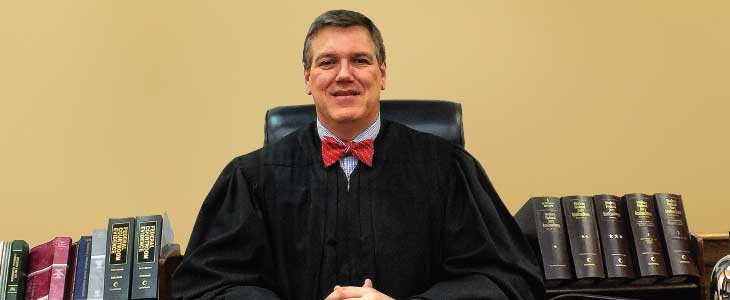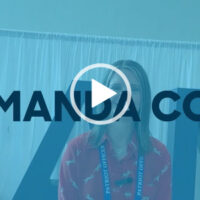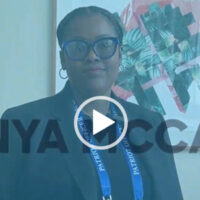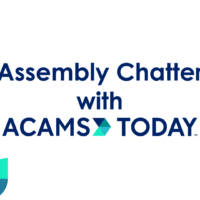
ACAMS Today sat down with U.S. District Judge Frank D. Whitney for the Western district of North Carolina, to discuss the evolution of money laundering (ML), asset forfeiture and the case of the missing copy of the Bill of Rights.
After graduating as a Phi Beta Kappa from Wake Forest University in 1982, Judge Whitney served on active duty in the U.S. Army before matriculating into the joint JD/MBA program at the University of North Carolina at Chapel Hill. While in graduate school, he worked as law clerk at the CIA Office of General Counsel.
Graduating with honors from law school in 1987, Judge Whitney served as a judicial clerk to the U.S. Court of Appeals Judge David B. Sentelle for the District of Columbia Circuit. During this clerkship, he worked on numerous matters involving national security law. After clerking, he joined the Washington, D.C., firm of McKenna, Conner & Cuneo.
Returning home to Charlotte in 1990, he spent the next 11 years as an assistant U.S. attorney with the U.S. Attorney’s Office in Charlotte, prosecuting ML, drug trafficking, health care fraud and other white-collar crimes. Developing an expertise in ML and asset forfeiture, he co-authored the treatise Federal Money Laundering: Crimes and Forfeitures. As a federal prosecutor, he cross-examined basketball great Michael Jordan and traveled to Budapest to confront suspected former Hungarian KGB operatives.
In 2001, he joined the firm of Kilpatrick Townsend & Stockton LLP as a white-collar defense counsel and civil litigator. In January 2002, President George W. Bush nominated him to the position of U.S. attorney for the Eastern District of North Carolina in Raleigh. As the U.S. attorney, he supervised the case of David Passaro, a CIA contractor who was the only civilian prosecuted for prisoner abuse in Iraq and Afghanistan. He also litigated the recovery of North Carolina’s original copy of the Bill of Rights, which had been stolen by a rogue Union soldier from the State Capitol in 1865.
In February 2006, President Bush nominated Judge Whitney for his current position of U.S. District Judge for the Western District of North Carolina. After U.S. Senate confirmation, he assumed the bench on July 5, 2006.
During his civilian legal career and law school, Judge Whitney served in the Army Reserve as a military intelligence officer from 1982 to 1993 and as a judge advocate from 1993 until his retirement in 2012. Prior to retiring, in 2011 he deployed to Kuwait, Iraq, and Afghanistan as a military judge and presided over the last court-martial in Iraq during the drawdown of forces. Judge Whitney was honored with a Bronze Star for his combat service.
In addition, he has served as an instructor on ML and forfeiture for the U.S. Department of Justice (DOJ), FBI, Secret Service, ATF and IRS Criminal Investigation.
ACAMS Today: How did you get started in the anti-money laundering (AML) field and what drove you to become an AML expert?
Judge Frank Whitney: I would not say that it was completely by accident, but it was mostly by accident. I found myself practicing law in Washington, D.C., and I wanted to return to my home in North Carolina. Thus, I applied for an assistant U.S. attorney position in Charlotte. I had never thought about serving as a federal prosecutor, but it seemed like a great job and it would help me transition into the North Carolina legal market. While I intended to stay only a couple of years, I ended up staying for 11. Most of my work involved AML, forfeiture, financial crimes and drug trafficking. That is how I got started in the AML field. Nothing drove me to become an AML specialist; it was just the work I was assigned at the U.S. Attorney’s Office, and I found it fascinating. It helped that I had a financial background with an MBA.
AT: As a highly successful individual, what characteristics are the most important in obtaining a high level of success?
Hard work will help position you to be near the right place at the right time
FW: The most important characteristic in success is hard work. If you are dedicated to what you are doing and you work hard, positive things will happen. While luck has much to do with being in the right place at the right time, hard work will help position you to be near the right place at the right time.
AT: Which case that you have prosecuted has had the most significance on your career or was the most memorable?
FW: The most memorable case was the recovery of North Carolina’s copy of the original Bill of Rights. There were initially 14 copies of the Bill of Rights—one for the U.S. and one for each of the 13 original states. North Carolina’s copy was stolen by a rogue Union soldier in 1865 from the North Carolina capitol. I was part of a team of prosecutors and agents to help recover and adjudicate its return to the people of North Carolina. The case has been featured on both the History Channel and the Discovery Channel. Historian David Howard wrote a book about the case, Lost Rights: The Misadventures of a Stolen American Relic.
AT: Which clue broke the case and led to the discovery of the Bill of Rights?
FW: A rogue Union soldier who was part of General William Tecumseh Sherman’s force occupying Raleigh in the spring of 1865 stole the Bill of Rights from the North Carolina state capitol. When the soldier was released from duty, he returned to Ohio where he sold it to Charles Shotwell in 1866 for $5. Shotwell took it to Indianapolis where his family lived and it stayed in the Shotwell family for the next 134 years, handed down through three generations.
Wayne Pratt, an antiques dealer on the Antiques Roadshow, learned that two elderly sisters, both of whom were direct descendants of Shotwell, were attempting to market the Bill of Rights through Sotheby’s. Because the experts at Sotheby’s knew that the Shotwell sisters’ claim to ownership was dubious at best, Sotheby’s declined to market the Bill of Rights. Pratt learned from a friend at Sotheby’s that the missing Bill of Rights might be available. Thus, Pratt, with money from investors, confidentially approached the Shotwell sisters. To verify the authenticity of the Bill of Rights, he and his team took the Bill of Rights to a think tank at American University in Washington. This think tank focused exclusively on the first U.S. Congress (the Congress that actually drafted the Bill of Rights). The experts confirmed to Pratt that this was very likely North Carolina’s copy of the Bill of Rights, that a private party could not legally own a public document and that North Carolina would likely claim ownership. Despite being warned that he could not legally own the document, Pratt and his investors paid the Shotwell sisters $400,000 for the document and then tried to sell it on the black market for as much as $30 million.
Pratt initially tried to sell the Bill of Rights to someone of enormous wealth who could then loan or donate it to a museum. When that effort failed, he attempted to sell it directly to a museum. He approached the National Constitutional Center in Philadelphia. While interested in the document, the historians at the National Constitution Center immediately realized that there was a serious legal question regarding title and ownership. The directors of the National Constitution Center asked the governor of Pennsylvania, Ed Rendell, to call the governor of North Carolina, Michael Easley, to learn if North Carolina might assist in the purchase of the document and not oppose the National Constitution Center from possessing it. While Governor Easley knew that he would not surrender North Carolina’s claim to the document, he temporarily went along with Governor Rendell’s request to give the North Carolina Attorney General, the FBI, and U.S. Attorney’s Offices in Raleigh and Philadelphia time to arrange an undercover sting to recover the document from Pratt. The FBI undercover operation in Philadelphia, in which the National Constitution Center became a critical participate, resulted in a safe recovery of the document. And then, for the next 18 months we litigated in both state and federal courts who or what entity actually owned the Bill of Rights. With the substantial assistance of the U.S. Attorney’s Office in Raleigh, North Carolina eventually prevailed and the Bill of Rights is now in the possession of the State Archives of North Carolina.
Another significant AML case in which I was involved was a prosecution of a real estate agent who assisted her client in laundering drug proceeds (United States v. Campbell). The drug dealer wanted to purchase a house, however, his reported income, which did not include his drug proceeds, was insufficient to qualify for the necessary mortgage. To help the drug dealer purchase the house without disclosing his illegal income, the real estate agent actually helped the drug dealer deliver $60,000 in a brown paper bag to the sellers and did not report it in the closing documents. While the real estate agent did not know for sure that her client was a drug dealer, she knew that her client was handling dirty money. Thus, the jury concluded that she knew she was handling dirty money. This was the first prosecution within the DOJ based upon a “willful blindness” theory of knowledge.
AT: At the recent SAS Counterterrorism Financial Crimes Forum, you proposed the idea of changing the threshold on currency transaction reports (CTRs). Could you expand on this idea?
FW: If you were to adjust to inflation the $10,000 currency reporting threshold from 1970 to today, the new threshold would be approximately $63,000. This is a dramatic increase. Today, many small businesses (particularly small, family-owned convenience stores and restaurants) are filing CTRs—lots of CTRs. This generates far more CTRs in 2015 than were contemplated in 1970. While 2015 data technology allows law enforcement to handle the CTRs, these small businesses are hit with a regulatory burden of CTR compliancy when that was never contemplated in 1970. Think how few currency transactions in 1970 met a $63,000 threshold. Is it really fair that simply from inflation we have added this regulatory burden on small businesses? Finally, some of the structuring cases profiled and criticized in the media lately involve this very type of small business: family-owned convenience stores and restaurants. In recent media criticism, we have seen greater political pressure and oversight from Congress.
I am not saying we should raise the threshold to $63,000, but increasing the threshold to $15,000, $20,000 or $25,000, would reduce the burden on small businesses. If we do not increase the threshold and occasionally adjust it to inflation, we are going to continue to draw more and more small businesses into having to file CTRs through their financial institutions.
I know the FBI and others in the law enforcement community do not want to change the thresholds. Advancing technology makes it easier for law enforcement to process the increasing amount of data. There is no denying that the current thresholds help give law enforcement information that might lead them in the right direction. However, we need to have a very open and serious discussion about it, and at what point do we put too much of the cost on preventing criminal activity on the backs of small businesses.
AT: What about law enforcement who say that these CTRs also lead us to thwarting financial crime or the financing of terrorism?
FW: They do and that was the whole purpose of the CTR. The CTR was created by the Bank Secrecy Act (BSA) to help us thwart criminal activity, including terrorism. But we have to step back and ask: In 1970, was there any intent to have thresholds so high that today the equivalent threshold would be $63,000?
AT: Would the threshold be raised across the board such as CMIR, FBAR, or would you argue to maintain some thresholds and not others? If so, why or why not?
FW: I would not raise the thresholds of other reporting requirements. Other reporting requirements are pretty straight forward. For example, the CMIR is merely checking a box on a piece of paper that you have to fill out as you enter the country. So, it is not much of an issue. And as to the FBAR, we know most American currency is outside of the U.S. So, we do need to have more oversight on currency outside of the U.S. coming into U.S.
AT: In your role as an instructor of AML and asset forfeiture, what are the areas or concepts that most people need training on or that are the most problematic for financial crime prevention professionals?
FW: As an instructor, I have tried to focus on “following the money.” IRS criminal agents, accountants and CPAs, are particularly good at auditing, accounting and tracing funds. But most federal and state agents and prosecutors are not trained in these financial areas. Those agents and investigators are great at investigating drug trafficking and violent crimes with all the forensic tools related to those crimes (fingerprints, DNC, etc.). Following the money, however, gives you great evidence of motive (that is typically greed) and of unexplained wealth (expensive cars and flagrant spending). Most importantly, following the money leads investigators to assets for seizure and forfeiture. Criminals, including terrorists, need and want money. There is nothing that bad guys hate more than seeing their criminal proceeds seized and forfeited. Literally, following the money takes the profit out of the crime.
Finally, sometimes it is hard to prosecute a suspect because the suspect is a fugitive or has moved to a country where extradition is rare or not available. While you might not be able to arrest the suspect, you can still seize and forfeit the suspect’s assets in the U.S. and even assets laundered into other countries.
AT: Have you trained law enforcement how to deal with other countries in getting asset forfeiture?
FW: Yes. I have had the pleasure of attending and lecturing at numerous international AML seminars in Europe, the Mideast and Asia. Through the Financial Action Task Force and U.N. efforts, the international community is becoming more aggressive in combating international ML and terrorist financing. At conferences I have attended, financial intelligence unit leaders from around the world (including representatives from the U.S.) come together to network, share investigative techniques and discuss trends in international ML, including transnational organized crime and emerging terrorist organizations. These conferences are very effective and U.S. law enforcement should attend as many as possible.
A popular topic at recent international conferences has been tracing assets of deposed political leaders who stole from their countries’ treasuries before they were toppled. The U.S. DOJ has worked hard to assist these countries in recovering assets laundered into the U.S. and other countries by these former dictators.
AT: How have things changed in ML and other financial crimes since you started prosecuting criminals 25 years ago?
FW: In 1990, ML was a vague term and was not well understood by the average American. Today, the average American understands that the laundering of dirty money is a criminal act intended to layer criminal proceeds into the legitimate economy. The BSA and the Money Laundering Control Act were big steps forward in combating ML. However, the USA PATRIOT Act in 2001 was the biggest step when it mandated AML compliance programs in financial institutions and effectively created a whole new profession of AML specialists.
We must remember, however, that the benefits of aggressive AML have placed a hefty regulatory burden on financial institutions. We need to keep a balance, making sure the cost of AML compliance does not substantially outweigh its benefits. While I am a strong supporter of AML compliance programs, I am also a strong supporter of making sure that they are not too burdensome on the private sector.
AT: Any other advice you would like to share with the ACAMS’ community?
Following the money is the best tool in thwarting criminal activity
FW: Tracing monetary instruments and reviewing financial reports leads to uncovering terrorism, transnational organized crime, including drug trafficking, and other criminals who intend to do harm to the U.S. and its people. Following the money is the best tool in thwarting criminal activity. So, to all of the AML specialists out there, keep doing what you are doing and thank you for doing what you are doing.










